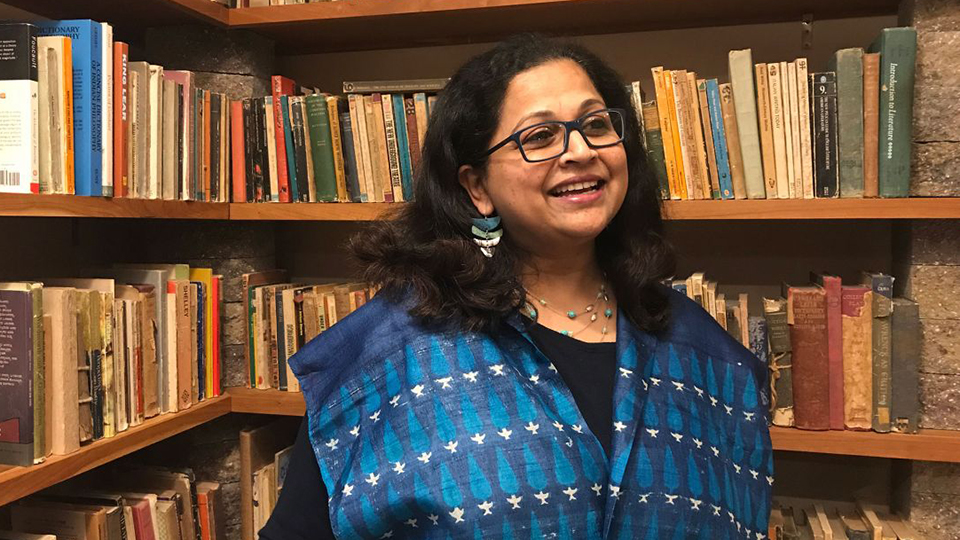Weaving stories: Leela Prasad ’93 shares how K-State experiences inspire her work as an author and educator
Religion.
Anthropology.
History.
Literature.
These are the individual threads — each one a complex, multi-layered topic worthy
of exploration and discussion — that weave together to form the life work of Leela
Prasad ’93.
Prasad — an author and a professor of religious studies, and gender, sexuality and
feminist studies at Duke University — earned a master’s degree in English at K-State
and has dedicated her career to sharing important stories. She knows the power of
words to illuminate dark or forgotten corners of history, preserving the past and
driving change in the present.
It is in recognition of the potential of her ongoing work that she recently was named
a Guggenheim Fellow. Each year, the Guggenheim Foundation awards fellowships to individuals making their mark in the social sciences, the natural
sciences, the humanities and the creative arts.
“The beauty of the Guggenheim Fellowship is that it does not have a formal program,”
Prasad said. “It gives Fellows uninhibited freedom, literally with no strings attached,
to pursue their projects.”
It is an honor Prasad does not take lightly, and she plans to use this opportunity
to write a book, tentatively titled Being Human at the Edge, which explores the resonance of Mahatma Gandhi on people who have read his work
while in prison.
“It is special for me to share the news of this award with K-State because it was
in the Writing Center that I first engaged a formerly incarcerated person, whose essay
drafts we worked on together,” she said. “I decided then that one day, I would work
with incarcerated and released individuals.”
Deep roots
During her time as a master’s student in the K-State Department of English, Prasad
served as a graduate student instructor and taught courses in expository writing and
poetry. She also worked in the Writing Center.
“I entered K-State’s Department of English as an international graduate student,”
she said. “I was still quite new to the country, although I had lived for a year in
Hanover, New Hampshire. Until then, I saw America through the American literature
I had read in India, and through the stories I had heard from my father who was one
of the first Indians to earn his Ph.D. in English at Harvard. Firsthand, in Hanover,
I had experienced the snowy cold and the culture of the northeast, but it was in K-State
that I learned to be both an American graduate student and a teacher.”
Although Prasad spent only a few years on K-State’s campus, she says her experiences
have stayed with her for 30 years. It was here that she learned how to be a critic
without being derogatory; how to let go of conventions to elicit creativity; and how
to make a diverse community for collective flourishing.
“The roots of my research interests are in the work I did while at K-State,” she said.
“Some of my closest friendships today go back to those two years.”
Freedom to flourish
During her time in the K-State Writing Center, Prasad worked with an older, formerly
incarcerated student — an experience that impacted and forever changed her.
“On the one hand, I was learning to let go of so-called rules of grammar to help the
student articulate his story about his 18 years in prison — 18 years of being wrenched
from a daughter who had been a baby when he was imprisoned — and on the other, I was
learning about America’s entangled histories of race, class and incarceration,” she
said. “I was shocked by his experience of growing up Black in the Midwest — this wasn’t
Walden Pond — and I have realized that I need to keep that sense of shock alive if
I want to do anything about social injustice.”
She said that when an opportunity arose at Duke some years later to teach in the federal
prison near Butner, North Carolina, she grabbed it. She taught a graduate course on
Gandhi’s modernity in federal and state prisons while simultaneously documenting the
life stories of individuals who have experienced prison.
Her current book project examines how Gandhi inspired individuals who have served
prison sentences in contemporary India to re-make themselves, even when the odds seem
stacked against them.
“In all these contexts, prison-affected people navigate dehumanizing inequities, stigma
and violence that follow them after they leave prison,” she said. “I learned from
these individuals that even amidst specters of crime and violence, Gandhian nonviolence
— defined by a commitment to truth, inclusivity, compassion and service — can become
a methodology of everyday life.”
More about Leela Prasad
- In 2023-2024, Prasad is serving as a visiting professor of religious studies at Brown University.
- She currently serves as vice-president of the American Academy of Religion and will become its president in 2025.
- During her time at K-State, she received the Jerome Johanning Memorial Scholarship awarded to an outstanding Graduate Teaching Assistant in K-State’s Department of English.
- She also received the Golden Key National Honor Society’s award for the best Graduate Teaching Assistant at K-State in 1991.

